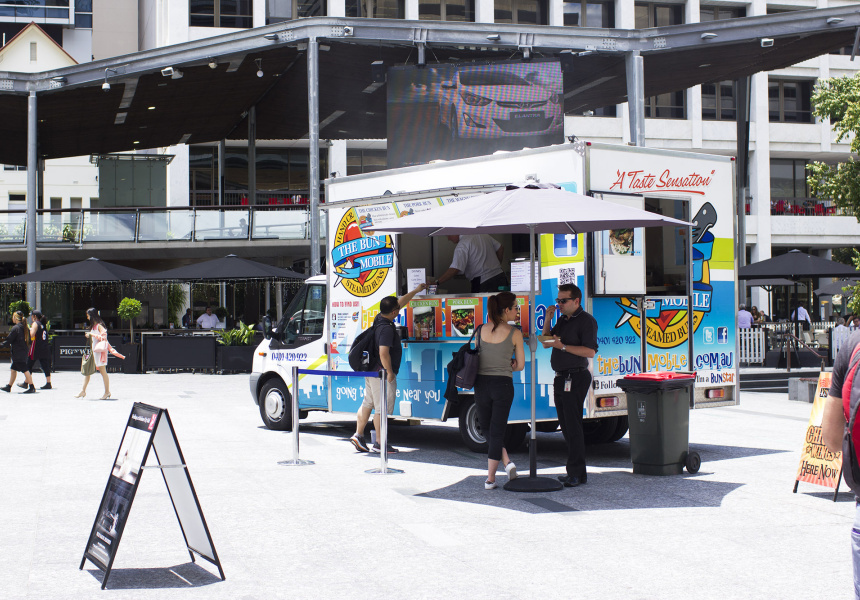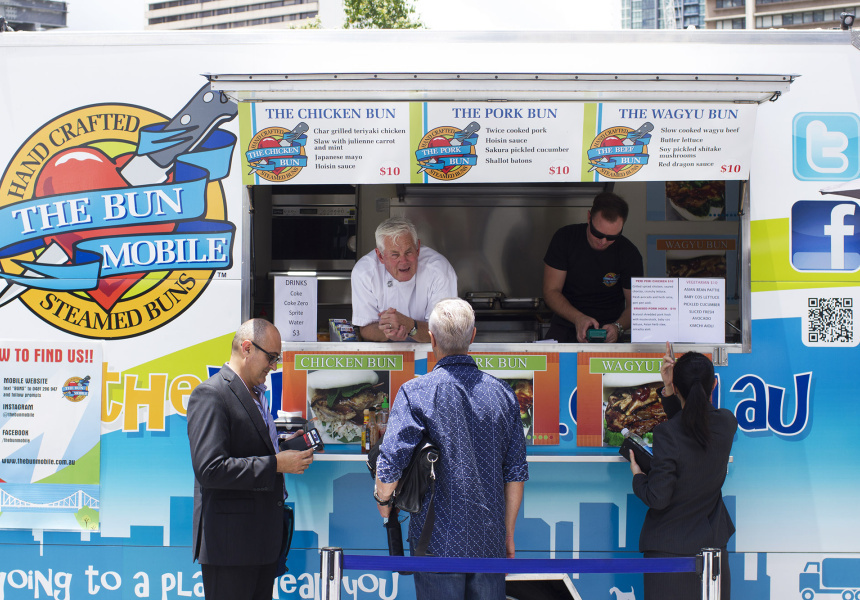You’re on the beach this summer. The sun’s shining, the waves are rolling in. People are playing cricket on the grass nearby. All that’s missing is beer.
And then a truck arrives. It pulls up next to the burger trucks, slides open a window, erects a sunshade and starts serving ice-cold stubbies. Easy. After a couple of rounds it rolls out, leaving you to enjoy your encroaching sunburn.
Jerome Borazio has had this dream. The entrepreneur behind generations of trend-bucking bars in Melbourne, as well as the nationally touring St Jerome’s Laneway Festival and St Jerome’s Hotel, has a penchant for making fringe ideas a reality. He’s even tried to do something about it. Except in Borazio’s first iteration, it was a boat, not a truck.
Never miss a Brisbane moment. Make sure you're subscribed to our newsletter today.
SUBSCRIBE NOW“You go down to Torquay, Lorne, Sorrento, any of these places,” says Borazio, referring to some of Melbourne’s most popular holiday spots. “Imagine having a boat cruise around all the little beaches and drop off some cold beers. What more could you want? But try to do that on a beach in Australia and you’d be crucified.”
Borazio says he actively looked into the possibility of making a beer boat happen. But it was an extension of his very first inspiration: a roving beer truck.
“Maybe 15 years ago, that’s all I ever wanted to do,” he says. “To build a really cool beer truck that would travel around to festivals and markets and wherever. There’d be DJs on the roof. It wouldn’t be so much a party vibe, more of a chilled thing. The kind of thing you sometimes see in Europe. Why not here?”
Borazio’s idea was ultimately put on ice by the intricate web of sponsorship deals most music festivals and other major events sign themselves up to. It was just too hard to find a space for an independent operator.
But the idea holds. Why isn’t there a roving summer beer truck? An operator that pulls up in a public spot and simply starts serving beer? Especially now a new food truck seems to launch every other week? The short answer is it’s made impossible by liquor licensing regulations in different states around the country. But talking to Borazio, you realise it’s a little more nuanced.
“Imagine on a hot day, rolling down to Fed Square or a public place in the city and serving a couple of cold beers,” says Borazio. “That sounds OK in [principle]. But you’ve got operators right there who are paying monster rents who need security, RSA, the whole shebang. You can understand why it would be unfair for a beer truck to pull up out the front one of those places. There’s an element of applying the same rules to everyone to keep a level playing field.”
Borazio raises other issues on which the idea would potentially become unstuck. Council support would be imperative, he says, as would careful planning around waste management and community impact.
“You can’t just have a truck or a boat rock up with the intention of selling as much booze as possible, then leaving without addressing anything else,” he says. “What’s the benefit to the municipality where you’re turning up, outside of providing a service?
“You’ve got to look at it from all angles,” he continues. “Imagine you’re in your favourite park walking your dog with your kids and suddenly a van rocks up and there’s 30 people smashing cans. How do you feel about that? Do you feel intimidated? Do you feel scared? And then, are there enough bars already in that area? Are there too many food trucks? Would it complement a food truck?”
It’s these kinds of questions that quickly stack up.
Queensland liquor laws tend to be more stringent than either Victoria or New South Wales. Leon Lechner has had to grapple with them more than most. As one of the brains behind Knock Knock Booze There, an online-based home delivery service, Lechner operates well outside the typical realm of pubs, clubs, bars and bottle shops.
“There are irregularities here but it’s no different to the way Queensland legislation approaches many other industries,” says Lechner. “It’s one of the reasons a lot of people used to go south, where there were more opportunities to push your ideas.”
The closest Lechner ever got to the idea of a roving booze truck was when he looked into turning a fire engine into a distillery-on-wheels. Lechner says Queensland’s liquor legislation has fallen behind the market it’s supposed to regulate, making these kinds of ideas difficult to implement. But what really but the brakes on it was confusion between different government departments.
“You go to one governing body and they don’t see a problem with it,” he says. “Then you go to another and it’s put in the too-hard basket. The longer it’s in that basket, the harder it becomes. And that’s when small businesses fail.”
Lechner says Queensland suffers from other issues related to new ideas around serving alcohol, such as onerous red tape and an under resourced Office of Liquor and Gaming. “Liquor Licensing have a lot on their plate,” he says. “They’re not a massive department. So setting up these different licences for more unusual ideas isn’t going to happen until there’s proper demand.”
Lechner says the key to Knock Knock Booze There’s success was a particular interpretation of the law, and total transparency with the business’ case officer at the Office of Liquor and Gaming.
“We didn’t have to shake the tree because of that interpretation of the law,” he says. “Our dialogue [with the case officer] was very open and transparent, rather than a game of cat and mouse like they usually have to deal with. That way is more productive because you’re upfront and open about what you’re trying to do.”
Borazio says despite the legal hurdles, he reckons a roving beer truck might one day be possible.
“If you were dedicated, I’m sure you could navigate your way around it,” he says. “An innovative, forward-thinking council might look at something like that. [But you’d] have to be very well organised. “ He returns to the questions the very idea of a beer truck provokes. “If you serve someone then drive off and they leave their beer can on the ground, what happens then? Who’s managing that? You need to take all of those elements into consideration.”
We can dream.
This article produced by Broadsheet in partnership with James Squire.




